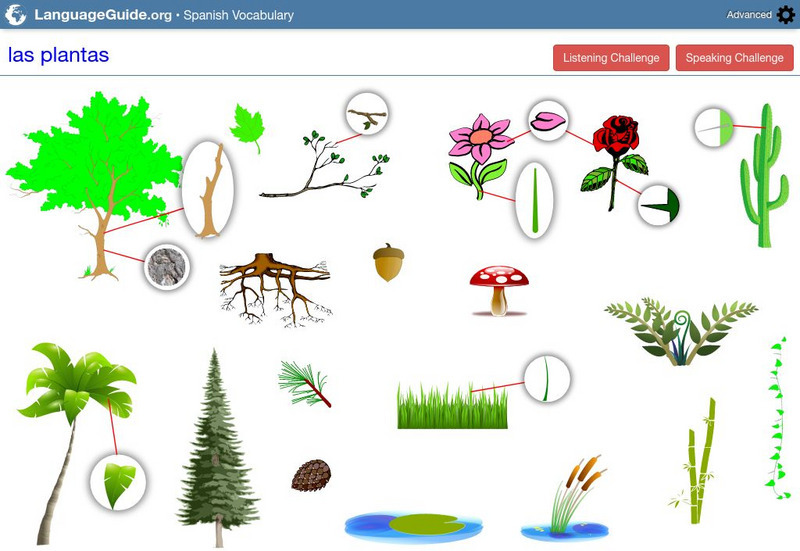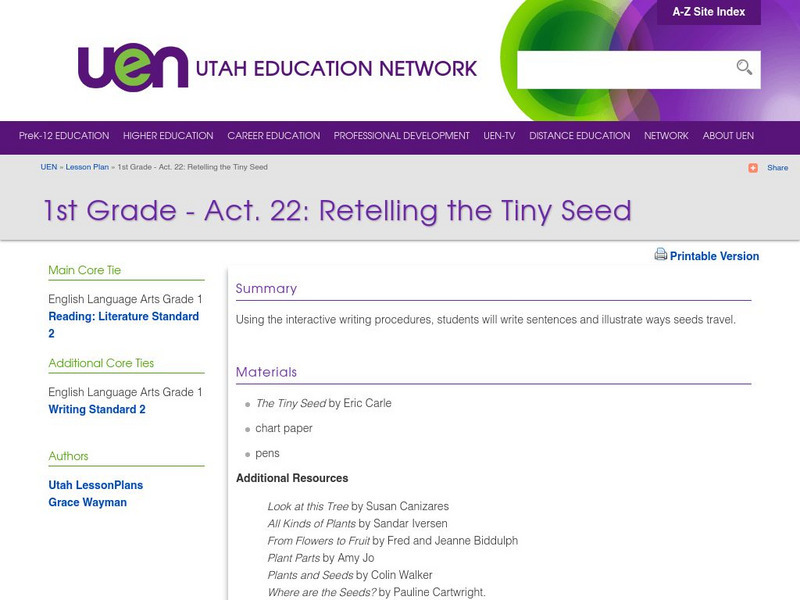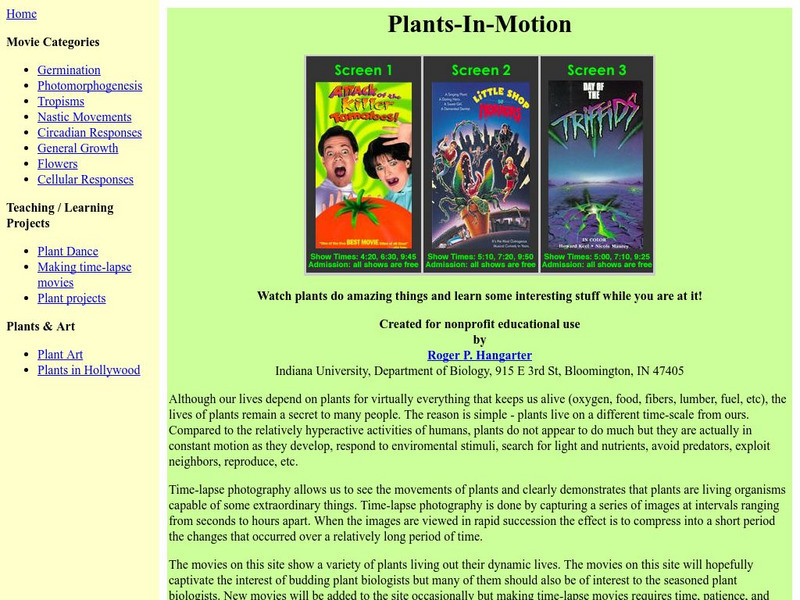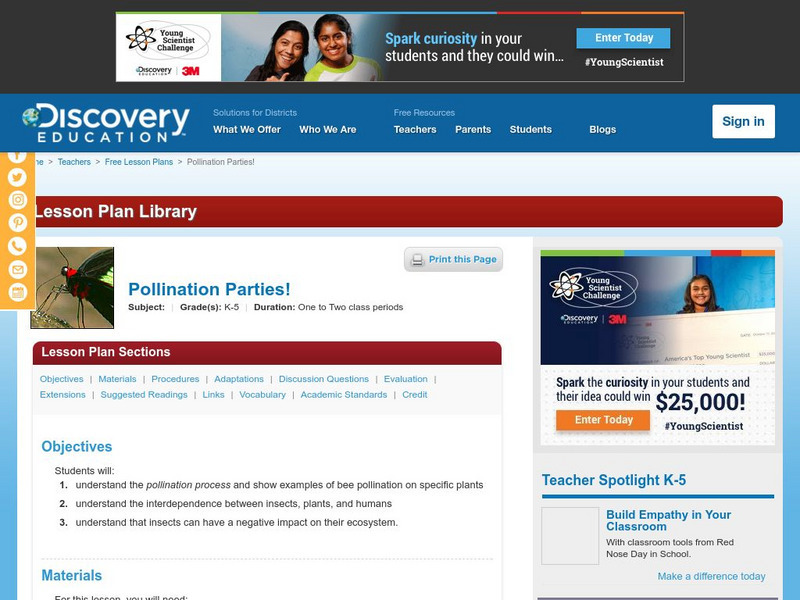Curated OER
Flowers -- The Smile of Divine Love
Students collect quotations and information on flowers. They write poems about flowers and grow their own. They draw pictures of different flowers and add descriptions of them.
Curated OER
Grain Properties Activity
Students study the similarities and differences of five different grains. They analyze the characteristics of corn, sunflower, milo, wheat, and soybeans.
Curated OER
Color Garden
Pupils brainstorm types of flowers and the colors they can be. They are to keep a chart of the ones mentioned. They create their own paper flower garden on the bulletin board and examine books about flowers.
Curated OER
Tulips: Predicting the Arrival of Spring
Learners use the blooming of tulips as a tool to measure spring's journey north. They predict when tulips bloom at 13 selected Journey North gardens in various geographic regions.
Curated OER
Predicting the Greening of Spring With Red Emperor Tulips
Students examine seasonal changes by watching tulip plant growth across the continent utilizing the Journey North website. They develop hypotheses as to why the plants emerge and grow where they do.
Curated OER
Wildflower Database
Young scholars investigate characteristics of Northeast Oregon wildflowers in order to create a database. Students use a drawing template to study the characteristics of wildflowers, and enter these characteristics into the database.
Curated OER
Sunflower Seed House
Students use sunflower seeds to make a picture of a house. This lesson plan uses the book, "Sunflower House."
Smithsonian Institution
Smithsonian Learning Lab: Plants and Animals: Partners in Pollination
Smithsonian Education presents a series of three lesson plans whose focus is plants and animals in their role as partners in pollination. Each lesson comes complete with clear learning objectives, materials list, subjects covered,...
Language Guide
Language Guide: Las Plantas
Colorful pictures of trees, flowers and other plants interact with audio and the written word as you move your mouse over the illustration. Vocabulary is in depth enough to be at an intermediate level.
Other
Kansas Wildflower and Grasses
A list of Kansas Wildflowers and Grasses. Includes photos and information.
Missouri Botanical Garden
Missouri Botanical Garden: Biology of Plants: Pollination
Learn the parts of a flower and how a plant gets pollinated. Includes video, songs, diagrams, and lesson plans.
Idaho State University
Idaho Museum of Natural History: Guide to the Plants of Idaho State Arboretum
This resource describes the different plants of the Idaho State Arboretum in Pocatello. Users are provided with a picture and a description of every plant in the arboretum. You can click on the pictures for a larger view.
BBC
Bbc: Did You Know? Flowers
This BBC "Gardening with Children" section walks through the important process of pollination. Learn exactly what pollination is, along with pollination with and without insects. Finally, learn some unique facts about pollination and...
Utah Education Network
Uen: 1st Grade Act: 22: Retelling the Tiny Seed
This lesson engages students in story retelling to Eric Carle's book, The Tiny Seed. Students will participate in interactive storytelling as they write sentences and illustrate pictures about seed travel.
Other
Rose Hills Foundation Conservatory for Biological Science
All about plants has information on plant parts--seeds, flowers, fruits, roots, and spores--and plant processes--seed dispersal, germination, pollination, and photosynthesis. You can also take a tour of this Los Angeles-based...
Unite for Literacy
Unite for Literacy: Plants and Food: Dandelion Days
Read about the life cycle of dandelions from their first appearance in the spring. Includes audio narration in 16 additional languages with text in English.
Indiana University
Indiana University: Plants in Motion
Plants grow and change on a time scale that is too slow for us to observe in real time. Time-lapse photography is a simple technique that allows us to see the movements of plants and clearly demonstrates that plants are living and...
University of Illinois
University of Illinois Extension: My First Garden
Learning about gardens, flowers, vegetables and the principles of horticulture can be a really fun experience. Discover about the beauty of gardens, and the care involved in planning, nurturing and enjoying the benefits of gardening in a...
Discovery Education
Discovery Education: Pollination Parties
This activity helps young scholars understand the concept of pollination. Objectives, materials, procedures, adaptations, discussion questions, evaluation, extensions, suggested readings, links, vocabulary, and academic standards are all...
PBS
Pbs Kids: Elinor Wonders Why: Elinor's Nature Adventure
Come explore with Elinor! Use the tools provided to observe your environment as you take a nature walk. What will you find?
University of Illinois
University of Illinois Extension: Plantenstein Is the Suspect!
Detective Le Plant has discovered that one plant can produce many other plants. He needs you to help him find out how this happens. Follow along and learn about the parts of flowers and reproduction. Along the way, you will be quizzed!
San Diego Zoo Global
San Diego Zoo: Trees
Comprehensive overview of trees features facts on structure, leaves, species, characteristics, reproduction, and conservation.
San Diego Zoo Global
San Diego Zoo: Flowers
Certain plants are known for their eye-catching blooms. Think of roses, orchids, carnations, and tulips. We often refer to these plants as "flowers." A flower, though, is just one part and quite an important part of a plant. Not all...
University of Florida
Florida Museum of Natural History: Plant Life
This teacher's guide focuses on the fascinating world of plants. Through books and other print materials, and exploration of actual plants, children will identify plants as living things, examine the parts of plants, experiment with what...




















